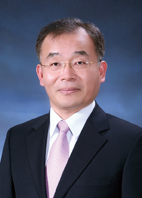Direction of 2012 Radiocommunication
Policies

The Korea Communications Co-mmission (KCC) has done many things in the radiocommunication sector in the past four years. First comes the supply of frequency bands in the telecommunications area. The 2010 withdraw and reallocation of the 800/900MHZ frequency band, the first such thing, put an end to a controversy over fair allocation of the premium band. This past January, Korea established a mobile roadmap, dubbed "Mobile Gwanggaeto the Great Plan," designed to redouble frequency band to brace for a mobile traffic upsurge. The nation test-broadcasted high-definition 3DTV live for the first time and came up with comprehensive plans to cope with radiocommunication dysfunctions, calling for setting guidelines for minimizing WiFi jamming, introduced a sampling radio station inspection system, and continuously relaxed restrictions on radiocommunication, including the simplifying of broadcasting and communication equipment certification.
Despite these achievements, there are numerous radiocommunication tasks to be tackled ¡ª wish lists in fields such as broadcasting, communication, the public sector, and life applications. In the broadcasting field, public expectation of next-generation high-definition broadcasting is mounting as 72 percent of survey respondents favor 3D broadcasting, whereas public complaints about radio broadcasting reception problems have been raised in provincial areas due to a shortage of frequency bands. The industry community has suggested that broadcasting outlets across the nation cannot air digital TV programs simultaneously during winter.
The thorniest issue in the communication area is how to supply frequency bands to address traffic surges. A survey indicates that mobile traffic is forecast to see a 13-fold jump by 2020, requiring an additional allocation of a minimum of 450MHZ and a maximum of 610MHZ. A parliamentary audit of the government conducted last October raised an issue that auctioning off frequency bands has put a financial burden on telecom providers and suggested that frequency use fees need to be lowered.
In the area of public frequency use, the bulk of frequencies are in public use, but the frequency demand is on the rise due to the upgrading of weapons systems. The reality is that management reform is essential for eliminating inefficiencies. The sharing of frequencies for commercial and public uses emerges as a means to cope with a growing frequency demand, as the United States and other major advanced countries have proactively turned to spectrum sharing policies.
In the category of life use, innovative services such as mobile charging and smart automobiles with automatic collision prevention systems make their debuts. Currently, Korea stands at about 40 percent of the United States and Europe in terms of the license-free frequency band category, so the related industry community wants to boost the sector through the supply of no-license frequencies and the relaxation of restrictions.
The KCC plans to push for major policy tasks in 2012 so that public demands on radiocommunciation can be satisfied. First, the KCC plans to implement the Mobile Gwanggaeto the Great Plan for the creation of the world's most spacious mobile broadband network. On top of the existing mobile 320MHZ band, we plan to allocate an additional 600MHZ of bandwidth by 2020. In the short term, the KCC plans to come up with a plan for the possible allocation of 170MHZ during this year and a plan to establish a "Clearing House," charged with radio-communication management for the purpose of the smooth implementation of the Mobile Gwanggaeto the Great Plan. This is the reason the efficient use and development of frequencies, a limited immaterial asset, is an essential task in the "smart era."
Second, we plan to have terrestrial broadcasting outlets' 3DTV programs test-televised during this year as part of efforts to invigorate 3DTV broadcasting and usher in an era of 4G broadcasting. The KCC will also select how to transmit digital radio signals that will allow for high quality of voice and data services and solve a shortage of frequencies.
Third, we strive to relax a variety of restrictions in order to create favorable conditions for inducing investments in 4G communication services. First of all, the KCC plans to dramatically lower the standard unit price for frequency use for mobile telecommunication, mobile virtual network operator (MVNO) and M2M (machine-to-machine) services.
Fourth, the KCC plans to revamp a public frequency management system so that efficiency and public interests can be harmonized. We strive to actively develop spectrum-sharing technologies, such as data-driven cognitive radio (CR/DB) while revamping related laws and systems to expand spectrum sharing.
Fifth, we want to ramp up the use of license-free frequencies so that innovative life application services can be offered to ensure the realization of a smart life. The KCC plans to allocate an additional license-free 7GHZ band by 2015. In 2012, we plan to supply the 2.5GHZ band for three mainstay sectors ¡ª 1Gbps WiFi, automatic collision preventing radar, and next-generation mobile charging stations ¡ª while relaxing restrictions such as the simplifying of complex technology standard systems in order to create the new service markets.
Lastly, the KCC is putting forward its fullest efforts to tackle radiocommunication dysfunctions such as public misgivings of electromagnetic waves. We plan to work out ways of introducing an electromagnetic wave safety grading system, set guidelines on safe use of mobile handsets and establish the "Korea Radiocommunication Cultural Foundation, which will be charged with research, survey and education on electromagnetic waves. We will also have the Space Electromagnetic Wave Center on Jeju Island offer forecasting and warning services and work out inter-ministry response steps to cope with massive solar wind and radiation. nw
By Park No-ik, director of radio policy department at the Korea Communications Commission
3Fl, 292-47, Shindang 6-dong, Chung-gu, Seoul, Korea 100-456
Tel : 82-2-2235-6114 / Fax : 82-2-2235-0799